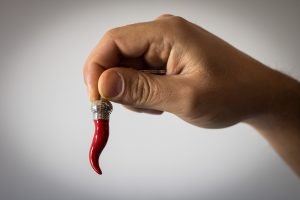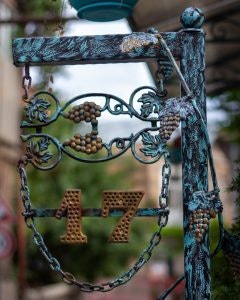Never sweep over someone’s feet
One Italian superstition is never to sweep over someone’s feet or have someone sweep over yours. If they do, you will never get married.
Don’t whistle indoors
Don’t whistle indoors in Italy. Whistling indoors brings bad luck and attracts evil spirits. This superstition likely originates from ancient times since whistling is similar to the sound the wind makes. This one seems like Italian culture values good manners more than an Italian superstition.
Receive your good luck wishes, in the right way
There’s an Italian superstition that directly accepting good luck might actually bring bad fortune. So, when someone is wishing good luck to you, it’s customary to reply with “crepi,” meaning “may the wolf die,” instead of “prego.”
By receiving the wish and wishing for something negative, you’re believed to attract good luck.
Don’t place your hat on a bed
Italian superstitions often involve symbols of death. It is bad luck to place a hat on a bed. This comes from the past when priests visiting people on their deathbeds would remove their hats and place them on the bed. Now the practice suggests an imminent death.
Eating lentils on New Year’s Eve brings good luck
There are many fun facts about Italian foods. For instance, eating legumes on New Year’s Eve brings good luck. Allegedly, lentils look similar to Roman coins and suggest prosperity in the year to come.

Lentils: Your Italian superfood on New Years
Tap the bottom of a glass on a table to ground your toast
When raising a toast, Italians often tap the bottom of the glass on the table to “bench” the toast, a tradition believed to seal the gesture.
When you clink glasses, God forbid you don’t make eye contact with your fellow toasters. Always, always look people in the eye.
Don’t toast with water
It’s bad luck to toast with water. Toasting with water suggests wishing the person you toast dies by drowning.
Raise your glass with wine or prosecco instead. This is one of the Italian superstitions I fully endorse.
Avoid seating 13 at the dinner table
The superstition about thirteen at the dinner table is rooted in Christian reverence and the Last Supper, where 13 guests were present before the crucifixion of Jesus. This leads to the belief that 13 guests at a table brings very bad luck, a notion that is still present in Italian culture.

The Last Supper spurs superstition about the number 13
Never open an umbrella indoors
Italians keep their umbrella holder outside the house to avoid opening an umbrella indoors. Opening an umbrella indoors leads to financial bad luck and suggests losing your home or facing a tragedy. See all the great Italian buildings but keep your umbrellas outside.
Carry a good luck charm on your wedding day
Grooms carry a piece of iron to ward off evil spirits. Brides make a small hole in their veil to let the good luck in.
Do wear red underwear on New Year’s Eve
Red underwear on New Year’s Eve is a must as it is believed by many Italians to bring good luck and prosperity in the coming year. To Intimissimi we go!
Wear your cornicello to ward off the evil eye
In Naples, the cornicello, a red chili pepper-shaped amulet, is believed to bring good luck and protect against the evil eye.
To be most effective, the little chili pepper cornicello must be gifted, not bought for oneself. This represents the horns of the Old European Moon Goddess and wards off bad luck while bringing good fortune.

Cornicello – The Italian Lucky Horn
Don’t let salt fall on the floor
Another Italian superstition is the belief that spilling salt leads to financial ruin. This comes from ancient times when salt was a valuable commodity in an Italian household.
To ward off bad luck from spilled salt, it is customary to throw a pinch of the grains over your left shoulder three times.
Italian superstition and your Swiffer agree: Don’t spill olive oil
Some Italians believe that spilling olive oil brings bad luck, a superstition that likely stems from the oil’s high value in the past. To counteract the bad luck, it is common to sprinkle a pinch of salt over the spill, as this is thought to neutralize any negative effects. It certainly becomes easier to clean.

Italian Superstition: Don’t spill olive oil. It’s bad luck
Beware black cats crossing in Italy
Pity the black cat. The fear of black cats is rooted in medieval folklore, where cats were linked to black magic. During the Middle Ages, people believed that roaming black cats were witches in disguise or sent by witches to spy on humans.
In 1233 AD, Pope Gregory IX declared that black cats were companions of witches and devils, leading to the killings of black cats.

Italian superstitions and black cats
17 is an unlucky number
In Italian superstitions, the number 17 is seen as unlucky. This belief is so strong that many Italian hotels skip the 17th floor and ITA Airways, the Italian national airline, omits both rows 13 and 17 on their planes.
The superstition about the number 17 comes from the Roman numeral XVII, which can be rearranged to spell “VIXI,” meaning “I have lived,” a phrase associated with death.

Italian superstition that 17 is the unlucky number
Don’t go to Poveglia Island
Poveglia Island is feared by many Italians. Public access to the island is banned. Perhaps this is because the island was a quarantine station during the plague and then served as a mental hospital.
An abandoned mental hospital with lots of bad luck is a landmark to avoid when visiting Italy. Here are the buildings to see in Italy.

Poveglia Island, Italy
Don’t take a bath when you’re sick
Another Italian superstition advises against taking a bath when you’re sick. Italians believe doing so will worsen the cold. Many Italians avoid this major no-no today.
These Italian superstitions are just one aspect of Italy’s rich cultural heritage, which also many groundbreaking inventions throughout history.
These superstitions might seem unusual to outsiders, but they are deeply ingrained in Italian culture. Whether you believe in them or not, understanding these superstitions can provide insight into Italian traditions and social norms. Remember, in Italy, it’s always better to be safe than sorry when it comes to good luck!
💡 Want more trivia?
Browse all Fun Facts articles.









